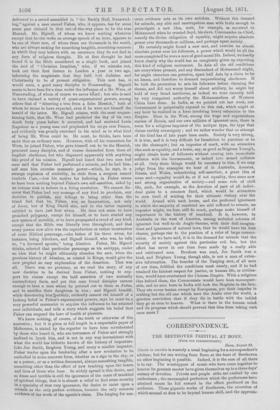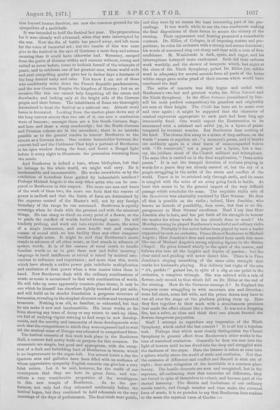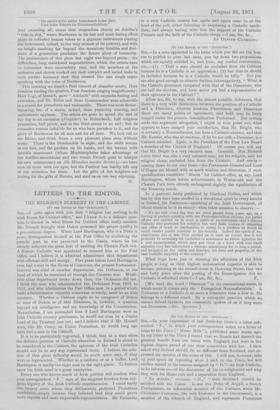CORRESPONDENCE.
THE BEETHOVEN FESTIVAL AT BONN. [nom OUR 001LREBPONDENT.] Bonn, August 23.
Gloria in excelsis is scarcely a usual beginning for a correspondent's advices; but for one writing from Bonn at the feast of Beethoven no other beginning is possible. Indeed, it is the sum of all there is to say. The worshippers of music who have come together to honour its greatest master have given themselves up to a three days' ecstasy of devotion. Priests and people alike are exalted by one enthusiasm ; the unexampled perfection which the performers have- attained meets its full reward in the effect produced on the audience. Those gigantic works of Beethoven, the execution of which seemed at first to be beyond human skill, and the apprecia-
tion beyond human faculties, are now the common ground for the sympathies of a multitude.
It was intended to hold the festival last year. The preparations for it were already well advanced, when they were interrupted by the war. Now the din of battle has passed away, and left room for the voice of immortal art ; but the results of this war must give to the festival in the eyes of Germans a more deep and solemn meaning than it could have otherwise had. (4ermany, escaped from the perils of division within and enemies without, strong and united as never before, turns to bethink herself of the triumphs of peace, and to celebrate one of her greatest sons, whose world-wide and soul compelling genius gave her in darker days a foretaste of the long desired unity and calm. You know I am not of those who confidently write down the French Republic pandemonium, and the new German Empire the kingdom of Heaven ; but on an occasion like this one cannot help forgetting all the errors and drawbacks, and looking only at the bright side of the German people and their future. The inhabitants of Bonn are thoroughly, determined to treat the festival as a national one. Almost every house is decorated. Looking from the market-place down any of the long narrow steeete that run out of it, one sees a continuous wave of banners ; amongst them are a few South-German flags, and here and there a stray nondescript ; but the North-German and Prussian colours are in the ascendant ; there is no mistake possible as to the general resolve to honour Beethoven to the utmost as a German hero. One zealous householder between the concert-hall and the Coblenzer-Thor kept a portrait of Beethoven in his open window during the feast, and burnt a Bengal light before it every night to illuminate the procession returning from the music.
And Beethoven is indeed a hero, whose birthplace, but that he belongs to the whole world, we might well envy. He is
inexhaustible and immeasurable. His works overwhelm us by the exhibition of boundless force guided by indomitable intellect? Perhaps Michael Angelo is the only other artist who can be com- pared to Beethoven in this respect. The more one sees and hears of the work of these two, the more one feels that the reserve of power is oodles?, and that the limits of form are determined by the supreme control of the Master's will, not by any foreign boundary of the range he can command. Beethoven is equally sovereign when ho deals with the greatest and with the minutest things, He can stoop to dwell on every petal of a flower, or rise to guide the conflict of worlds hurled through space. He will tenderly prolong, and work out into exquisite dreams, the notes of a single instrument, and anon handle vast and complex masses of sound with no loss facility than any other composer handles single notes. It might be said that Beethoven's music stands in advance of all other music, as that stands in advance of spoken words. It is of the essence of vocal music to handle familiar words so as to give them new and fuller meaning language in itself indifferent or trivial is raised by musical asso- ciations to influence and importance ; and more than this, words which have already a native power gain indefinite multiplication and exaltation of that power when a true master takes them in hand. Now Beethoven deals with the ordinary combinations of music as music is accustomed to deal with combinations of words.
He will take up some apparently common-place theme, it may be one which be himself has elsewhere lightly touched and put aside, and will build on its slender foundation a gorgeous structure of harmonies, revealing in the simplest elements endless and unexpected treasures. Nothing is so old, so familiar, so exhausted, but that he can make it new and inexhaustible. His latest works, so far from showing any trace of decay or any return to used-up ideas, are full of undying vigour striving to find scope in new develop- meats, and the novelty and immensity of these developments were such that the compositions in which they wore expressed had to wait till the musical sense of Europe was educated to comprehend them. The festival concerts of this week took place in the Beethoven Hall, a concert-hall newly built on purpose for this occasion. Its ornaments are simple, but good and appropriate, with the excep- tion of a dark and forbidding bust of Beethoven in bronze, which is no improvement to the organ-loft. For several hours a day the spacious area and galleries have been filled with an audience of whose appreciative sympathy English concerts can give but a very faint notion. Let it be said, however, for the credit of our countrymen that they are here in great force, and con- stitute a very considerable proportion of the worshippers in this new temple of Beethoven. As to the per- formers, not only had they rehearsed assiduously before the festival began, but they continued to hold rehearsals on the very mornings of the days of performance. The final trials were public, and they wore by no means the least interesting part of the pro- ceedings. It was worth while to see the two conductors snaking the final dispositions of their forces to secure the victory of the evening. Their appearance and bearing presented a remarkable contrast. Dr. Hiller, of Cologne, is of imposing stature and pro- portions; he rules his orchestra with a strong and serene dominion ; his words of command ring out sharp and clear with a tone of firm confidence. M. Wasicleuski is dark, spare, and eager, and his interruptions betrayed more excitement. Both did their arduous work worthily, and the shower of bouquets which, last night at the close of the Ninth Symphony, pelted Dr. Hiller (no milder word is adequate) for several seconds from all parts of the house within range gave ocular proof of their success which would have convinced the deaf.
The series of concerts was fitly begun and ended with Beethoven's two last and greatest works, the Missa Solennis and the Ninth Symphony. In the Missa Solennis (considered by him- self his most perfect composition) his grandeur and originality are seen at their height. The Credo has been set to music over
and over again ; it might ho supposed that the character of musical expression appropriate to each part had been long ago irrevocably fixed. One would expect the Resurrection to be
'announced with a subdued and awful joy, in a hymn of praise
tempered by reverent wonder. But Beethoven does nothing of the kind. The chorus dies away in a strain of deep sadness, on the words " pa.ssus et sepultus est ; " a moment's pause, and it breaks out suddenly again in a clear burst of unaccompanied voices with "Et rosurrexit," not a prayer nor a hymn, but a war- cry, the jubilant shout of the Church militant and triumphant.
The same idea is carried on in the final supplication, " Dona nobis pacem." It is not the tranquil devotion of recluses praying in words for a peace they are already assured of, but the cry of a people struggling in the midst of the storm and conflict of the world. Peace is to be attained only through strife, and its name is mingled with the noise of an army going forth to battle. At least this seems to be the general import of the very difficult passage which concludes the mass. The exquisite violin solo of
the Benedietus was admirably rendered by Herr Strauss. He does
all that is possible on the violin ; indeed, Herr Joachim, who knows no bounds of possibility, does snore, but that is no dis- paragement to Herr Strauss' excellence. Need 1 say that Herr Joachim also is here, and has put forth all his strength to honour the master for whose works he has already done so much? On Monday evening he played Beethoven's wonderful and solitary violin concerto. Probably it has never before been played by such a leader supported bysuch an orchestra. I have likened Beethoven to Michael Angelo ; Herr Joachim's firm and controlled force made him seem like one of Michael Angelo's strong reposing figures in the Sistine Chapel. He gives himself wholly to the spirit of the master, and follows him into all the heights and depths of passion ; but the clear mind and guiding will never desert him. There is in Frau Joachim's singing something of the same calm strength that marks her husband's playing. Her delivery last night of the aria " Ah, perfido 1" gained her, in spite of a slip at one point in the orchestra, • a complete triumph. She was saluted with a rain of flowers only second to that which foil on Dr. Hiller at the end of the evening. How do the Germans manage it ? In England the bouquets come straggling in with uncertain aim and direction ; some fall short, some fall wide, and the prima donna may have to run all over the stage or the platform picking them up. Here they flew together to their mark with a simultaneous precision that made the effect almost like a firework. It was not a dropping fire, but a salvo, so close and thick that one almost fancied the flowers dangerous projectiles.
Shall I attempt to reproduce any impression of the Ninth Symphony, which ended the last concert ? It is all but a hopeless task. Perhaps that which most cleirly distinguishes the Choral Symphony in general effect from Beethoven's other works is the tone of sustained exaltation. Generally he does not soar into the light of heaven until he has dived into the deep and struggled with the darkness of the abyss. Here the listener is taken at once into a sphere wholly above the world of strife and confusion. Not that the existence of difference and conflict and discord is shut out of sight ; that mere relegation of the inevitable is a common-place luxury. The hostile elements are seen and recognized, but in the supreme, all-embracing view that reconciles all difference, they are forced in spite of themselves to submit, and become part of the eternal harmony. The doubts and limitations of our ordinary moods vanish, and though number and time make the external form of music, it is no paradox to say that Beethoven here realizes to the sense the mystical verse of Goethe :— • " Da seihist nicht moor, heroelmest kcdne Zeit, jedor Schritt let Unermesslichkeit."
And crowning all, comes that stupendous chorus on Schiller's " Ode to Joy," where Beethoven in his last and most daring effort plays on collected human voices as a gigantic instrument (taxing the instrument, indeed, to the very utmost of its powers), and with an insight reaching far beyond the transitory troubles and divi- sions of a generation proclaims the future glory of humanity. The performance of this piece last night was beyond praise ; the difficulties, long considered impossibilities, which the artists have to surmount were successfully met, and the members of the orchestra and chorus worked out their complex and varied tasks in such perfect harmony that they seemed like one single organ speaking with the voice of Beethoven.
This morning we heard a final concert of chamber music, Herr Joachim leading the quartet, Frau Joachim singing magnificently ; Herr Vogl, of Munich, gave Adelaide" with exquisite feeling and execution, and Dr. Diller and Herr Griitzinacher were admirable in a sonata for pianoforte and violoncello. There was more flower- throwing, less of a storm, indeed, than yesterday evening, and enthusiastic applause. The artists are gone to spend the rest of the day in an excursion (Festfahrt) to Rolandseck, half religious procession, half picnic, and so the feast comes to an end ; but its • memories remain indelible for us who have partaken in it, and the glory of Beethoven for all men and for all time. We look out on the Rhine, and think Bonn a very pleasant place even without music. There is the Drachenfols in sight, and the swift stream at our feet, and the gardens on its banks, and the terrace with Arndt's monument (where Mephistopheles takes advantage of the warlike associations and two recent French guns to whisper his own commentary on Alto Menschen werden Brikier),—we have seen all these with our oyes, but the Festival has hardly left any of our attention for them. Let the gifts of Art heighten our feeling for the gifts of Nature, and send us on our way rejoicing.
































 Previous page
Previous page